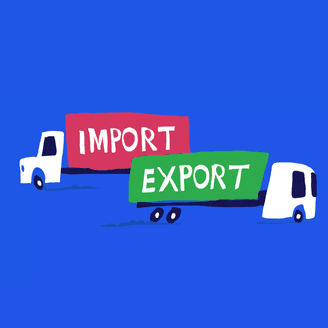- Osome Blog SG
- Import and Export Tips – Everything Singapore Businesses Should Know
Import and Export Tips – Everything Singapore Businesses Should Know
- Modified: 30 August 2024
- 6 min read
- Better Business


Osome Content Team
VIP Contributor
Osome has been collaborating with 21 authors from 4 countries. We embrace diversity and are proud that lawyers and founders, journalists and financial analysts choose to work with us.
Whether importing products into Singapore or exporting goods as a seller, the process can be challenging. Dealing with logistics and customs declarations can quickly add up, making the to-do list seem long and overwhelming.
So, it is essential to understand the steps to take when it comes to importing or exporting goods as a business or an international seller. This article will cover some of the frequently asked questions about importing or exporting goods in the Singapore.
FAQs About Importing Goods Into Singapore
Do I need to pay duty and/or GST payment when importing?
Yes, all imported goods are subject to GST and/or duty permit. GST is currently levied at 9% of the CIF (cost, insurance, and freight value). There are also dutiable goods, which incur both GST and duty—these include alcohol, tobacco products, motor vehicles and petroleum products.
To pay duty/GST, you’ll first need a customs permit.
How do I get a Customs Import Permit?
Register with the Accounting and Corporate Regulatory Authority (ACRA), or the relevant Unique Entity Number (UEN) issuance agency to obtain a UEN. Then, activate your Customs Account.
Having activated your Customs Account, you can then appoint a declaring agent to obtain a customs permit on your behalf, or you can do so yourself by registering as a Declaring Agent and applying for a TradeNet user ID.
Permit applications cost $2.88, which doesn’t include service fees charged by service providers such as freight forwarders or Declaring Agents.
Which goods are controlled/prohibited?
The following goods are controlled or outright prohibited:
- Chewing gum
- Pistol/revolver-shaped cigarette lighters
- Firecrackers
- Endangered species of wildlife/products derived from such animals
- Scanning receivers
- Military communication equipment
- Telephone voice changing equipment
- Radio-communication jamming devices (operating in any frequency band)
- Chewing tobacco (all types)
- E-cigarettes and vapes
- Shisha
- Smokeless tobacco products
- Nicotine/nicotine-based products
- Nasal and oral snuff
If you’re unsure, you can search to see whether specific goods are prohibited.
What is an Inter-Bank GIRO (IBG)?
You must apply for an Inter-Bank GIRO (IBG) at one of the IBG participating banks listed in The Association of Banks in Singapore’s website to pay duties, taxes, fees, or penalties when importing goods into the country. This IBG bank account will be linked to your UEN.
The application process is straightforward—simply send a completed Application for Inter-Bank Giro form to Singapore Customs’ (the address is listed on the form). Applications are usually processed in three to four weeks.
Alternatively, you can authorise your Declaring Agent to use your IBG on your behalf, though you can only do so after at least a day of your IBG having been approved.
Do I need to furnish security?
Furnishing security (i.e., providing creditors with something they can sell or possess in case you can’t meet your financial obligations) is required for transactions involving dutiable goods, the temporary import of goods for approved purposes, and for the operation of licensed premises such as licensed warehouses and excise factories.
For example, you can provide a Banker’s Guarantee, Finance Company Guarantee or an Insurance Bond to furnish your security.
How do I prepare documents for cargo clearance?
Approved permit applications are only valid for a specific time period. When importing containerised cargo, you’ll need the container shipper seal number when applying for a permit.
Approved permits applications are issued with a validity period. You should ensure the validity of the permit presented for goods clearance. For containerised cargo imports, you must provide the container shipper seal numbers when applying for a permit.
Documents required for containerised cargo
If you’re importing the cargo by sea, you don’t need to present printed copies of customs permits and supporting documents to checkpoint officers at the entry points. If you’re importing by air or by land, you have to present customs permits and supporting documents (such as the invoice, packing list and Bill of Lading/Air Waybill) to the checkpoint officers for verification.
Documents required for conventional cargo
You must present the goods, a printed copy of the customs permit, and supporting documents (such as the invoice, packing list and Bill of Lading/Air Waybill) to the checkpoint officers for verification when clearing the cargo.
Documents required for cargo clearance of air imports granted GST relief at Changi Airfreight Centre Checkpoint
Non-controllable and non-dutiable air imports with a total CIF value of S$400.00 or less qualify for GST relief, and are therefore granted a permit waiver. Freight forwarders/handling agents can use a summary list together with the invoice and House Airway Bill (HAWB)/consignment note for each parcel/consignment to facilitate cargo clearance.
Find out more here: Documents Required for Clearance of Goods.
Do I need to retain my trade documents?
The Singaporean authorities require companies to retain trade documents relating to purchases, imports, sales or exports for five years following the date of the permit application approval. You can either keep these in hard copy or as images.
Do I need to deposit my goods in a Free Trade Zone (FTZ)?
If you’re importing by air or sea, you’ll need to first deposit your goods in an FTZ. However, if for whatever reason this is not practical to do, you can instead deposit goods in customs-approved premises (such as licensed warehouses).
You only need to pay GST/duty if your goods are consumed within the FTZ, or when they leave and enter a customs territory to be sold/consumed.
Do I need to pay additional taxes when depositing goods in Licensed or Zero-GST Warehouses?
Again, storing goods in licensed warehouses doesn’t incur duty or GST—these are only payable when the goods are removed from the premises and enter a customs territory.
FAQs About Exporting Goods From Singapore
Do I need to register for a UEN and activate my customs account when exporting goods from Singapore?
In short, yes, you do. By registering with the Accounting and Corporate Regulatory Authority (ACRA) or the relevant Unique Entity Number (UEN) issuance agency, you can obtain a UEN before activating your customs account.
How do I get a Customs Export Permit?
You can either do this yourself, registering as a declaring agent and applying for a TradeNet user ID, or appoint a declaring agent to apply for a customs export permit on your behalf. As with customs import permits, each application costs $2.88.
When you export your goods, you’ll have to declare their FOB value on the export permit application.
How do I prepare documents for Cargo Clearance?
First, note that approved permits are issued with a validity period, and that you need to export your goods within this timeframe.
If you’re exporting containerised or conventional cargo that’s dutiable or controlled, you’ll need to provide the approved customs export permit and all supporting documents (e.g. invoices, packing lists, Bills of Lading/Airway Bills) to the checkpoint officers.
What is the Major Exporter Scheme (MES)?
The MES helps companies that re-export a substantial quantity of their goods to take control over their cash flow. Normally, businesses have to pay GST when importing goods into Singapore, then obtain a refund from the IRAS after submitting their GST returns. However, this negatively impacts cash flow for businesses that export most of their goods, as no GST is collected from the zero-rated supplies to offset the cash they spent on their imports.
Therefore, companies approved under the MES don’t have to pay GST for non-dutiable goods imported into Singapore, and on goods removed from zero-GST warehouses.
Below is a rough overview of how the MES works.
What are the customs permit requirements when using the MES?
Companies must obtain a customs in-non-payment permit before they can remove goods from the FTZ/entry point or the zero-GST warehouse under the MES. Declaring agents can only obtain permits on behalf of approved MES entities if they have been authorised using the online “Apply for Declaring Agents” system.
For collection of postal parcels at SingPost Centre, an MES trader must present the Customs In-Non-Payment (Approved Premises / Schemes) permit before the parcel can be released without GST payment. Otherwise, the MES trader will have to pay GST on the parcel.
What happens if I make an error when exporting my goods?
Companies will be fined if they are found to have breached the requirements and conditions imposed by the Singaporean Customs Act, the Regulation of Imports and Exports Act (RIEA), and their subsidiary legislation such as the Regulation of Imports and Exports Regulations (RIER).
Minor offences usually warrant a fine under S$5,000 per offence, and offenders may even be prosecuted if they don't pay up. Additionally, offenders might be prosecuted if the offence is considered fraudulent or serious in nature.
Common offences include the following:
- Making an incorrect declaration, such as declaring the wrong value of items on the export permit
- Failing to declare when you’ve exported goods from Singapore, making a declaration after they’ve already been exported, or exporting goods using an expired permit.
- Failing to produce documents when requested by Singapore customs—for instance, invoices, bills of lading, or certificates of origin for verification.
- Failing to produce the necessary licences, permits, or failing to submit export documents to Singapore customs within 14 days after the vessel/aircraft has departed.
- Making false declarations.
With this long importing and exporting to-do list, the last thing you need to worry about is your company’s financial admin. Luckily, we have a team of experienced tax advisers who can take care of just that.






